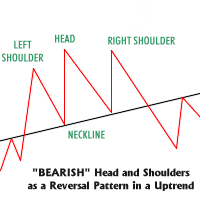Head & Shoulders Pattern
The Head and Shoulders Pattern is generally regarded as a reversal pattern and it is most often seen in up-trends. It is also most reliable when found in an up-trend as well. Eventually, the market begins to slow down and the forces of supply and demand are generally considered in balance. The Following is a Typical Trend of a Head and Shoulders Pattern

- Sellers come in at the highs (left shoulder) and the downside is probed (beginning neckline).
- Buyers soon return to the market and ultimately push through to new highs (head).
- However, the new highs are quickly turned back and the downside is tested again (continuing neckline)
- Tentative buying re-emerges and the market rallies once more, but fails to take out the previous high. (This last top is considered the right shoulder.)
- Buying dries up and the market tests the downside yet again. Your trend line for this pattern should be drawn from the beginning neckline to the continuing neckline.
New selling comes in and previous buyers get out. The pattern is complete when the market breaks the neckline. (Volume should increase on the breakout.)
HERE IS A SAMPLE CHART WITH A HEAD AND SHOULDER FORMATION










